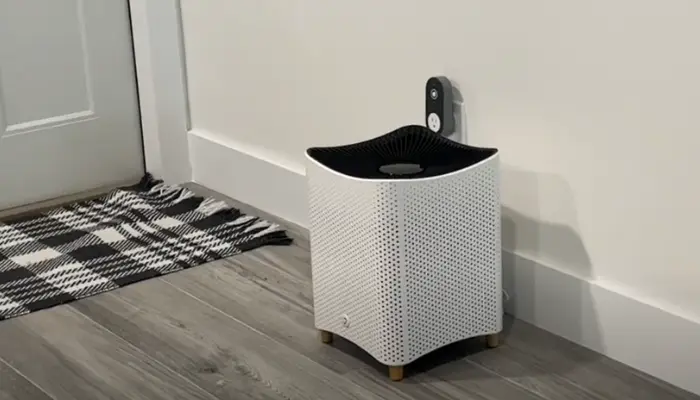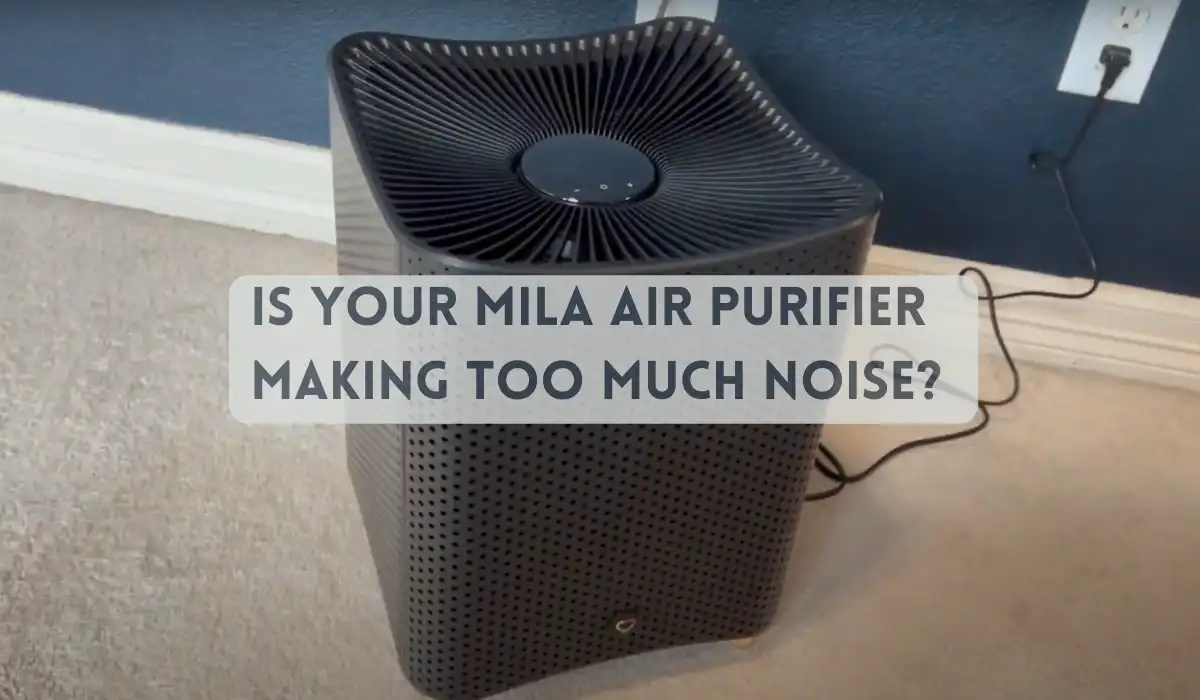Last Updated on April 14, 2024
Air purifiers are becoming more popular for cleaning and purifying indoor air. As more models enter the market, one brand that has been gaining attention is Mila air purifiers. These smart devices use advanced HEPA filtration and analytics to optimize purification.
Some Mila air purifier owners have reported issues with the devices making excessive noise during operation. This can disrupt sleep and relaxation or simply become an annoyance over time.
This detailed article covers Mila air purifier noises, why they generate them, and how to fix a noisy purifier.
Why Do Mila Air Purifiers Make Noise?
There are a few primary reasons why your Mila air purifier might be making audible noise:
- Fan operation at higher speeds
- The buildup of dust and debris
- Clogged or damaged filters
- Issues with device calibration and performance
- Firmware bugs producing abnormal sounds
In most cases, some noise is perfectly normal during operation. The internal fan needs to spin at rapid speeds to pull air through the advanced filtration system.
Large buzzing, whining, whistling, or rumbling usually indicates maintenance or troubleshooting.
Common Noises Mila Air Purifiers Make
Let’s break down the typical noises you may hear from a Mila air purifier unit:
Beeps and Alerts
Your Mila air purifier may produce beeping alerts to indicate the following:
- The filters need replacing
- There’s an error that requires your attention
- A system reset or recalibration is taking place
These beeps are normal and help keep the purifier running optimally. However, constant beeping can indicate an issue needing resolution.
Clicks and Rattles
Internal parts may click or rattle as the fan adjusts speeds. This usually occurs during calibration and doesn’t indicate a problem.
Crackling
You may hear light crackling as the air purifier’s filtration system captures and contains large particles like pet dander, pollen, or smoke. This helps confirm your unit is trapping contaminants.
Large debris may have entered the housing, or the ionizer pins need cleaning if loud crackling occurs.
Hissing
Your Mila air purifier may make white noise or hissing even at modest fan speeds. This generally softens over time as internal parts wear in.
Failure parts may cause loud hissing, significantly when fan speeds are increased or decreased.
Whistling
High-pitched whistling indicates a clogged, broken, or unplugged filter. It may also indicate internal air leaks.
Resolve to whistle right away as it strains the motor and wastes energy.
Failing Internal Parts
If other troubleshooting doesn’t eliminate loud noises, parts may need replacement. Check warranty terms or contact Mila customer support.
How to Quiet a Noisy Mila Air Purifier
To diagnose and fix the Mila air purifier whistling or rattling, follow these steps:

Step 1: Unplug the purifier and check for debris. Remove filth, dander, and dust from moving parts with a vacuum and brush.
Step 2: Remove filters and check for damage or clogs. Replace damaged filters after soaking filthy ones in warm water and mild detergent to dissolve tenacious grime and air-dry before reinstalling.
Step 3: Make sure filters are firmly clicked into their slots and the housing cover is properly reattached without gaps for air leaks.
Step 4: Reconnect, turn on, and listen to the lowest fan setting. Test noise with higher airflow by steadily increasing speed.
Step 5: Check Mila’s support site and your manual for device calibration instructions if whistling or buzzing persists. Perform a reset and fan speed optimization sequence.
Step 6: Update your Mila air purifier’s firmware to the latest available version after checking the release notes. New updates often resolve performance issues.
Step 7: Relocate the device away from walls, furniture, and blankets that could block airflow and cause strain.
Step 8: As a last resort, contact Mila customer care via email or phone if excessive mechanical noise continues under warranty. Request replacement parts or a refund.
FAQ
- Why has my Mila air purifier started making loud humming lately?
Intense new humming or vibrating from your purifier over time likely indicates accumulated internal dust buildup or failing parts like motors and fans wearing out.
- The fans in my air purifier hiss when ramping up or down. Is this normal?
Some hissing during fan calibration isn’t unusual for any air purifier model, including Mila. But loud, strained hissing may mean damaged filters or loose housing parts.
- My Mila device whistles constantly. What should I check?
Consistent high-pitched whistling typically indicates a clogged, missing, or disconnected filter. Or it could point to an internal air leak in the housing or a failing motor.
- How often do I need to check a Mila purifier’s filters to prevent noise?
Mila recommends replacing filters every 6-12 months, depending on runtime. Check indicator alerts monthly and inspect filters quarterly for dirt buildup that reduces airflow and causes whistling.
- Where should I place a noisy Mila purifier to help reduce sound?
Ensure your Mila device sits on a solid surface at least 8 inches from walls or objects that might block airflow. Bedrooms may transmit more mechanical noise.
- Can I reduce noise by switching filter types in my Mila purifier?
All genuine Mila filters meet strict specifications for model compatibility. But more advanced True HEPA filters capture more allergens than basic types, keeping the housing interior cleaner to prevent dusty buildup noise over time.
Takeaways: Resolving a Noisy Mila Air Purifier
Finally, here are the important steps for troubleshooting the Mila air purifying system buzzing, grinding, or whistling:
- Inspect and clean device interiors regularly to prevent debris buildup and noise
- Check, clean, or replace filters as needed every 6-12 months
- Make sure filters seat firmly in slots to prevent air leaks
- Update firmware and perform resets to finish calibrating
- Reduce fan speeds, especially for nighttime use
- Relocate units away from objects blocking airflow
- As a last fix, request replacement parts or refunds under warranty
A bit of motorized hum is expected from Mila air purifiers. But following this noise reduction guidance will help ensure your unit cleans indoor air quietly and optimally.
